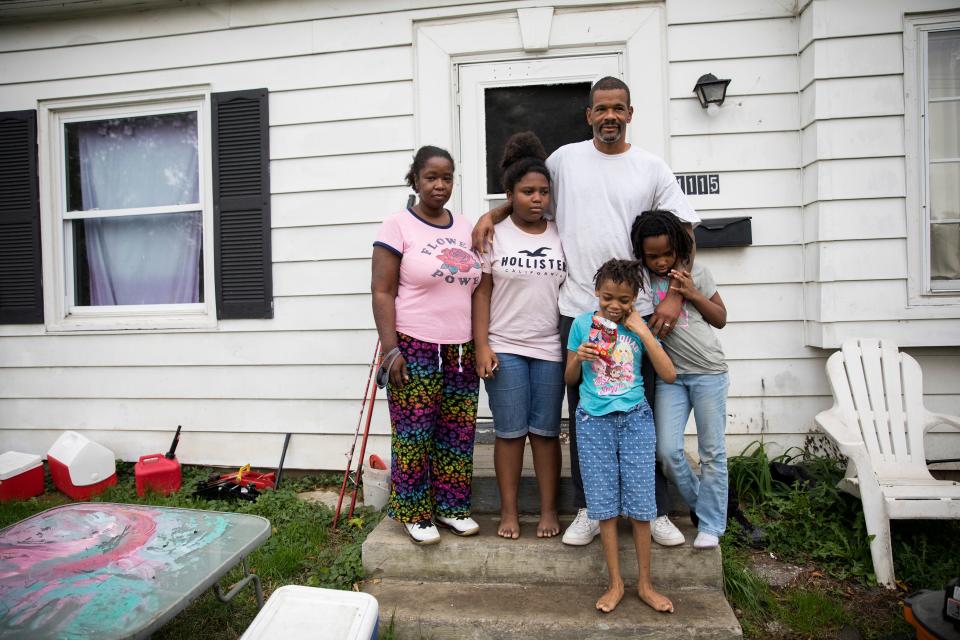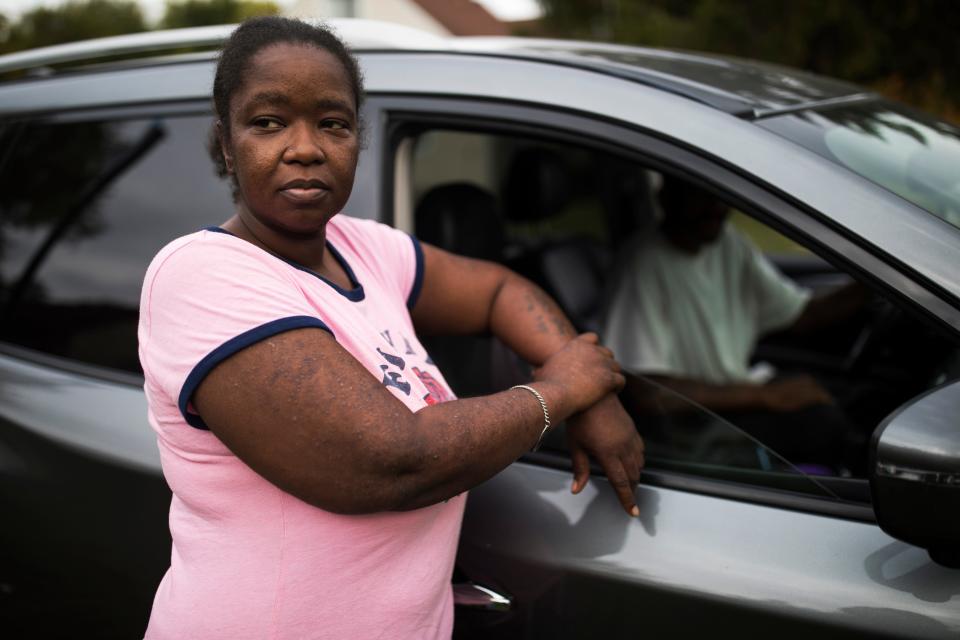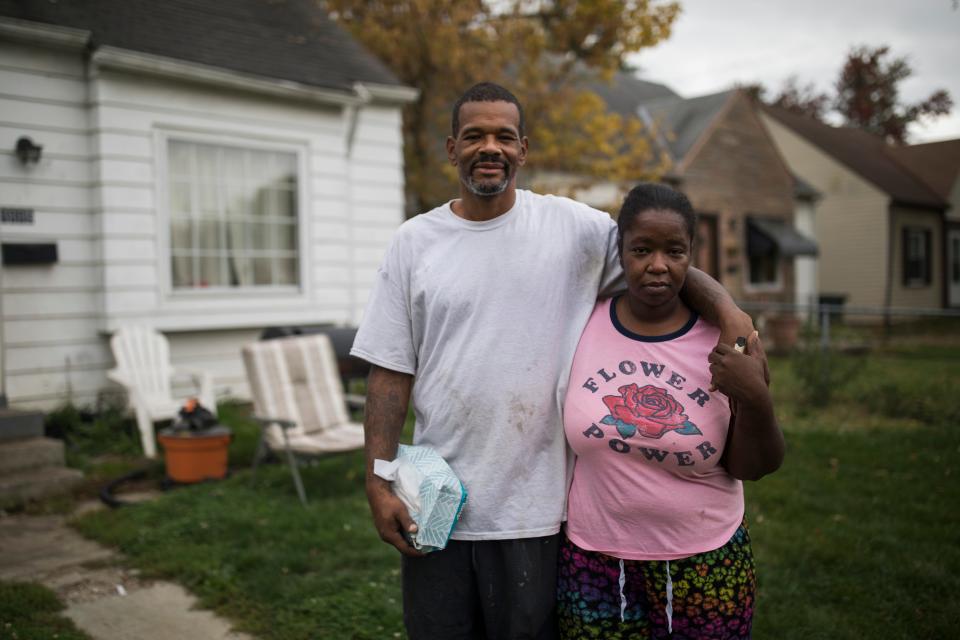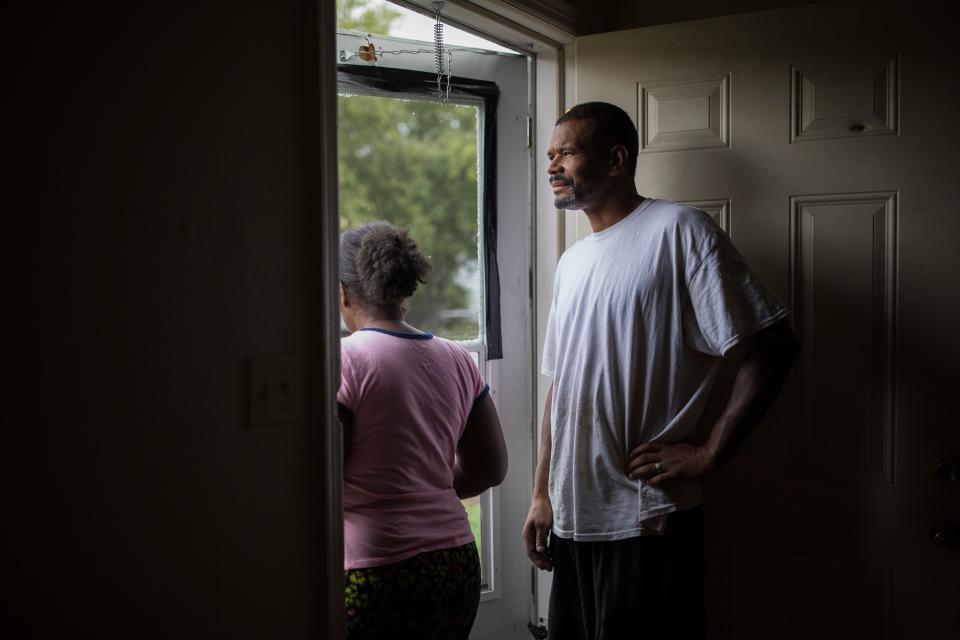'We needed some food': Seven months into pandemic, families struggle to meet basic needs
By early October, Kaneadsha Jones was close to giving up. It had been seven months since she or her husband had steady work. Seven months since her three school-age children, including a 14-year-old daughter with autism who is blind, nonverbal and immunocompromised, had been to school. Four months since a shooting on her block left her car and her family’s rented house in north Columbus, Ohio, riddled with bullet holes and her 12-year-old daughter struggling with severe post-traumatic stress disorder.
The pressure of it all – the hunger, the constant worrying, the desperation to find some stability – was crushing. Some days, she struggled to get out of bed.
“I’m so tired,” Jones said. “It seems nothing is getting a little better. The only thing that keeps me trying is my family.”
Each day, she faced the same worries and tremendous stress as the day before: Would her landlord start eviction proceedings again soon? When would her car be repossessed? Was her internet bill past due, and if so, how would her children attend school online? If she put gas in the car to get to the grocery store, would she be able to buy food? In the rare weeks when there was a bit of money left over, should it go toward rent, water or electricity?
Jones, 43, a U.S. Army veteran and a certified medical assistant with an associate degree in applied science, is one of millions of parents who have seen their lives upended by the coronavirus pandemic.

For families living in or at the edge of poverty, the effects of the pandemic have been especially devastating. While child care centers and schools are closed and safety nets disintegrate under enormous demand, families that have been thrust into poverty see little hope of getting out. Meeting basic needs such as food and shelter has become a daily challenge; many are one eviction notice away from homelessness. Parents go without food to feed their children, relying heavily on free lunches from schools and food banks, many of which have strained to meet demand.
Families hoped that more federal funds would provide some sort of lifeline, but relief legislation is still up in the air.
Federal Reserve Chair Jerome Powell warned that without more federal support, there would be “unnecessary hardship for households and businesses.”
COVID-19 and colleges: 10 historically Black colleges will get millions from Gates Foundation for COVID-19 testing
“It is ridiculous that these things are even being allowed to happen to people,” Jones said. “People need to know this pandemic doesn’t affect everyone the same.”
Jones has never been one to wither in the face of challenges. Discharged honorably from the military after having an epileptic seizure, Jones spent years as a single mother to her four children. She tried her hand at several careers, working as a certified medical assistant at a crisis counseling and rehabilitation center, a home health aide and a patient care advocate, among other jobs. She worked while going to school to earn her medical assistant certification in 2017, ensuring her children had stable housing.
She and her daughters, Kamari, 14, Ma’Kaylah, 12, and Trinity, 8, have lived in the same rented house for more than five years. “Even when I was working, it was hard,” Jones said as she took a break from washing and detailing cars. “This pandemic has made everything that much harder.”

'We needed some food'
Last winter, Jones had a steady, decent-paying job that she enjoyed at a call center. In March, when the pandemic hit and schools closed, she quit. She said her bosses wouldn’t allow employees to wear masks or gloves in the packed office, and they wouldn’t let her work from home. She couldn’t risk exposing her immunocompromised daughter, Kamari, to the coronavirus, and she didn’t feel comfortable leaving her children at home all day, where the two youngest would be responsible for caring for their older sister. (Her oldest daughter, Brooklynn, 22, lives in her own apartment.)
Jones hoped the beefed-up unemployment benefits in the Coronavirus Aid, Relief and Economic Security Act in the spring would help the family get by. Instead, she hit a tangle of red tape: Her unemployment application was denied because she was still listed as employed in the call center’s records. When she finally proved she wasn’t, the payments were put toward a debt she owed for overpayment of previous unemployment benefits. She applied for food stamps but was stymied once again; she made too much money to qualify based on the unemployment she was supposed to be receiving but wasn’t.
Bills piled up. Jones and her husband, Ezekiel Roulette, who met several years ago while they worked at a rehabilitation center, did any jobs they could find, including cutting grass, home demolition and running a car washing and detailing service from home. As the pandemic spread and businesses shut down, the work dried up.
COVID-19 and online learning: Here's how much it costs parents to have children learn remotely
The family fell behind on rent. Their landlord started eviction proceedings against them in midsummer, then Jones received one-time rent assistance from IMPACT Community Action, a nonprofit group in Columbus, Ohio. The group received so many requests for help, it had to shut down its program for rental or mortgage assistance in early October and was still trying to process 3,000 applications for help in its queue.
The family’s only stable income was $760 a month in Social Security Disability Insurance for Kamari and child support, which totals $169 a month. Rent alone, if they paid it in full, was $725. That left about $200 for food, car payments, gas for the family’s car and utilities. Knowing the city was halting utility disconnections for nonpayment during the spring, Jones prioritized food, gas and internet. When the family’s federal relief check for $2,700 arrived in May, she spent nearly all of it catching up on utility payments.

In August, Jones overdrew her bank account to pay for internet, so her children could start virtual classes. The family had relied on free meals distributed through the girls’ schools all summer, but more often than not, they didn’t have money to bridge the gaps between those pickups. Jones took more money she didn’t have out of her checking account for a few groceries: milk, bread, eggs and ramen noodles. “I’ll pay it back. I didn’t have a choice,” she said. “We needed some food. … We’re going to do whatever we have to do.”
Nationwide, food insecurity has become a pervasive problem. The percentage of families with children who reported not having enough to eat more than tripled in July compared with 2019. One report found nearly half of American families lived with hunger in the summer.
Another found more than 40% of surveyed households with children had used up all or most of their savings by early August. Children in households making less than $100,000 have been especially affected: 74% of those families experienced serious financial problems.
Coronavirus and schools: When should students stay home? Here's what to know
Food insecurity and financial hardships have been even more devastating for Black and Latino families. In a study of households with children nationwide, 61% of families overall reported facing serious financial problems during the pandemic. Eighty-six percent of Latino families and 66% of Black families reported financial hardship.
Experts said the data doesn’t paint a true picture of the damage to families. Much of it was collected before the end of provisions in the federal coronavirus relief act, including extra unemployment money that many families used to make up for job losses.
“Now that some of those (protections) have fallen off, our assumption is that the situation is probably worse,” said Julie Morita, executive vice president of the Robert Wood Johnson Foundation, which partnered with NPR and the Harvard T.H. Chan School of Public Health to conduct the survey. “It’s a tragedy.”
Safeguards such as relief payments, the federal moratorium on evictions in most cases and extra funding for food stamps need to continue, experts said. In September, more than 19 million people reported to the U.S. Department of Labor that they were unable to work or worked fewer hours because their employer closed or lost business during the pandemic. Thousands of families have received eviction notices despite a federal ban against such proceedings. In New York state, 39% of parents polled said they have skipped or reduced meals for themselves or their children as a result of the pandemic.

'We can't keep this up'
In late summer, Jones went to a veterans assistance office, but she said she was told she didn’t meet the criteria for aid, which included proof that she could pay some of her expenses.
“I am a U.S. Army vet, military police officer, and I’m a certified medical assistant with an associate degree in applied science,” Jones said. “I am just so in awe that I can’t find any help.”
Desperate for income, Jones and her husband started delivering groceries, making $8.75 a delivery. They took a job washing and detailing cars for a dealership, where they were paid $40 per car minus supplies they had to purchase themselves, such as car wax and polish.
Coronavirus and colleges: Some college students didn't show up amid COVID-19, recession
Her children stayed at home during the day, along with several cousins. Jones put two of the oldest, who were 12 and 13, in charge. She checked the law to make sure it was legal to leave them home alone and gave them strict instructions: Don’t open the door. Don’t even ask “Who’s there?” Don’t look out the window. Don’t go outside.
“We can’t keep this up,” she said as she took a break on a humid, 80-degree August afternoon. In between washing cars, she called to check on the children. “It’s just not going to work.”
In early September, online school began at the charter schools Jones’ two youngest children attend and at Kamari’s district school. She couldn’t get the Chromebooks the schools sent home to turn on. She drove across town to two separate schools to exchange them, twice. After several weeks and many conversations with tech support, Kamari’s Chromebook turned on but wouldn’t let her log in.

Jones picked up a small bag of school supplies from Kamari’s school and tried to do hands-on activities with her. She helped her feel a book and turn the pages, but lessons were often short-lived, she said.
Requiring her children to concentrate for hours of online school seemed impossible as Jones simultaneously searched for work to keep them fed and housed. Her 12-year-old, Ma’Kaylah, sometimes fell asleep. She developed a tic after witnessing the shooting on their street. Her head jerked, “sometimes uncontrollably,” Jones said.
After an uptick in violent crime on her block, Jones no longer let her kids out to play, even in the backyard, which shares a fence with a nearby apartment complex where Jones has often seen residents drinking outside. She dreamed of moving the family to the country, where they could have land and wouldn’t have to worry about gun violence. When they could afford the gas, Jones and her husband drove the children out of the neighborhood once a week, to a park where they could play and run around safely. A couple of times, they drove an hour northwest to a lake where they could fish and the kids could play at the playground. “It’s just calming,” Jones said.
More: Though it has no teachers, this company gets millions meant for private, charter schools
These brief escapes weren’t enough to alleviate her fears about how the pandemic was harming her daughters. Research has found that the stress of poverty, violence and loss can affect children’s brain development, learning, mental health and behavior, something Jones witnessed firsthand, especially with Ma’Kaylah.
“With all the stress we are going through just to keep food in the house and pay utilities, and just to have the essentials, she can see that,” said Jones, who sometimes ducked into the bathroom to cry, hoping her children wouldn’t hear or see her.
There were some things she knew she couldn’t hide. “No matter how hard we try to make things as normal as possible and shield the kids from the stress and anxiety my husband and I are facing,” she said, “it’s not working.”

'I'm tired of fighting'
On a Thursday morning in late September, the family headed out to pick up food from the girls’ schools, their main source of nutrition. Jones’ mind was racing with her newest concern: A family member had visited and brought in bedbugs. The family needed to throw out their furniture and find a way to replace it. One of her daughters had the option of going to school in person two days a week, but Jones was concerned she might catch the virus and bring it home.
Jones and her husband gave up on washing cars, which paid so little it didn’t cover the cost of supplies. She estimated she had applied to at least 20 positions in fast food, retail, call centers, grocery stores and gas stations. Despite her education and experience, she was willing to accept almost anything, as long as it felt safe. “I just want to be able to work in an environment that will not expose me to COVID-19,” she said.
In early October, Jones and her husband picked up extra grocery delivery jobs to make ends meet, but it still wasn’t enough. During the first week of the month, she and her husband didn’t eat for three days, so they could ration what food they had for the girls.
Jones received a letter from the Ohio Department of Job and Family Services in response to her appeal for unemployment. It said she wasn’t eligible for unemployment benefits because she had failed to prove she had been unemployed because of “disruptions caused by COVID-19.”
“I don’t know what else I can tell them,” she said.

The same week, Jones’ landlord served the family with a new eviction notice. Jones knew the Centers for Disease Control and Prevention had halted evictions in early September as a way to prevent the spread of the coronavirus but had been unaware of a form she needed to fill out and submit to her landlord. When she learned about it, she hurried to a library to print it out, hoping it would buy the family some time.
Jones’ oldest daughter assured her mother she could take the children if they were forced to move out of their home. Jones and her husband could sleep in their car.
In mid-October, Roulette was hired for a seasonal job working at a distribution center for a large, Columbus-based fashion retailer. He would make $18.50 an hour, an amount that felt inconceivable after months with no income. It was a welcome bright spot: A few days earlier, the family’s electricity was shut off. Jones had put all her extra money toward the gas bill that month instead.
Jones felt relieved, but she was desperate to find a job of her own. “I’m tired of fighting. I’m just trying to live and do what I can do,” Jones said. “It’s such a bureaucracy to get help. Those of us who truly need the help can’t get it.”
This story about poverty was produced by The Hechinger Report, a nonprofit, independent news organization focused on inequality and innovation in education. Sign up for Hechinger’s newsletter.
This article originally appeared on USA TODAY: COVID-19: Seven months into pandemic, families go without basic needs

